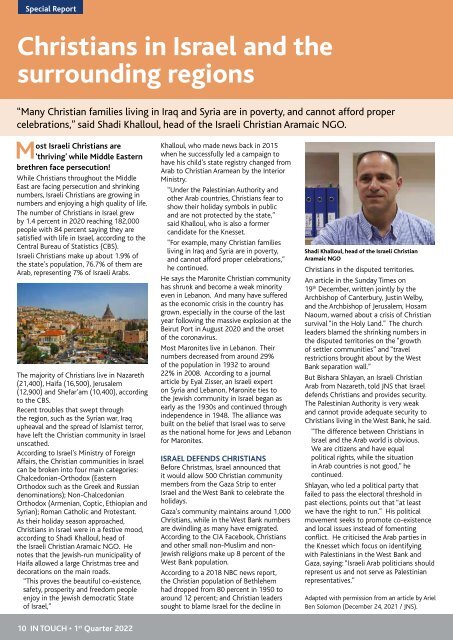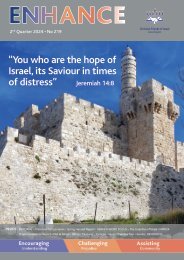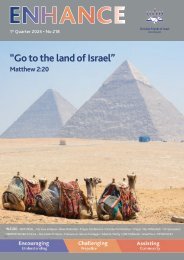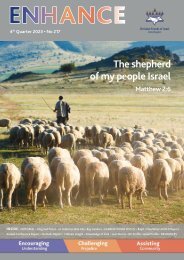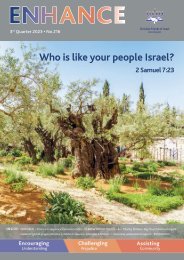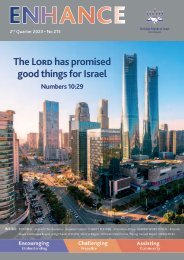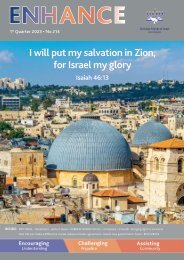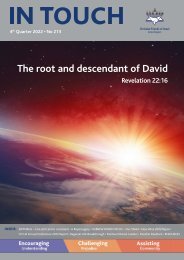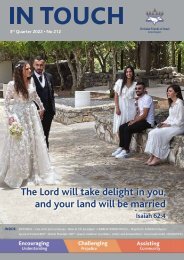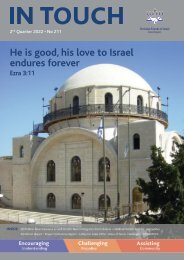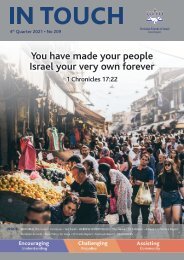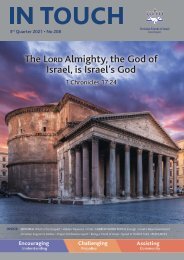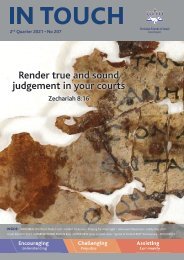In Touch - 1st Quarter 2022
Articles on: the continuing biblical story of the Line and the Land; restoring to wholeness (shalom); Christians in Israel; the Leica camera and the Jews; what the Apostle Paul meant when he wrote, 'all Israel will be saved'; the special story of one particular fiddle; CFI UK’s new Echoes of Sorrow exhibition; and Yair Lapid's aim to establish a coalition of nations opposed to a nuclear Iran.
Articles on: the continuing biblical story of the Line and the Land; restoring to wholeness (shalom); Christians in Israel; the Leica camera and the Jews; what the Apostle Paul meant when he wrote, 'all Israel will be saved'; the special story of one particular fiddle; CFI UK’s new Echoes of Sorrow exhibition; and Yair Lapid's aim to establish a coalition of nations opposed to a nuclear Iran.
- No tags were found...
Create successful ePaper yourself
Turn your PDF publications into a flip-book with our unique Google optimized e-Paper software.
Special Report<br />
Christians in Israel and the<br />
surrounding regions<br />
“Many Christian families living in Iraq and Syria are in poverty, and cannot afford proper<br />
celebrations,” said Shadi Khalloul, head of the Israeli Christian Aramaic NGO.<br />
Most Israeli Christians are<br />
‘thriving’ while Middle Eastern<br />
brethren face persecution!<br />
While Christians throughout the Middle<br />
East are facing persecution and shrinking<br />
numbers, Israeli Christians are growing in<br />
numbers and enjoying a high quality of life.<br />
The number of Christians in Israel grew<br />
by 1.4 percent in 2020 reaching 182,000<br />
people with 84 percent saying they are<br />
satisfied with life in Israel, according to the<br />
Central Bureau of Statistics (CBS).<br />
Israeli Christians make up about 1.9% of<br />
the state’s population, 76.7% of them are<br />
Arab, representing 7% of Israeli Arabs.<br />
The majority of Christians live in Nazareth<br />
(21,400), Haifa (16,500), Jerusalem<br />
(12,900) and Shefar’am (10,400), according<br />
to the CBS.<br />
Recent troubles that swept through<br />
the region, such as the Syrian war, Iraq<br />
upheaval and the spread of Islamist terror,<br />
have left the Christian community in Israel<br />
unscathed.<br />
According to Israel’s Ministry of Foreign<br />
Affairs, the Christian communities in Israel<br />
can be broken into four main categories:<br />
Chalcedonian-Orthodox (Eastern<br />
Orthodox such as the Greek and Russian<br />
denominations); Non-Chalcedonian<br />
Orthodox (Armenian, Coptic, Ethiopian and<br />
Syrian); Roman Catholic and Protestant.<br />
As their holiday season approached,<br />
Christians in Israel were in a festive mood,<br />
according to Shadi Khalloul, head of<br />
the Israeli Christian Aramaic NGO. He<br />
notes that the Jewish-run municipality of<br />
Haifa allowed a large Christmas tree and<br />
decorations on the main roads.<br />
“This proves the beautiful co-existence,<br />
safety, prosperity and freedom people<br />
enjoy in the Jewish democratic State<br />
of Israel,”<br />
10 IN TOUCH • 1 st <strong>Quarter</strong> <strong>2022</strong><br />
Khalloul, who made news back in 2015<br />
when he successfully led a campaign to<br />
have his child’s state registry changed from<br />
Arab to Christian Aramean by the <strong>In</strong>terior<br />
Ministry.<br />
“Under the Palestinian Authority and<br />
other Arab countries, Christians fear to<br />
show their holiday symbols in public<br />
and are not protected by the state,”<br />
said Khalloul, who is also a former<br />
candidate for the Knesset.<br />
“For example, many Christian families<br />
living in Iraq and Syria are in poverty,<br />
and cannot afford proper celebrations,”<br />
he continued.<br />
He says the Maronite Christian community<br />
has shrunk and become a weak minority<br />
even in Lebanon. And many have suffered<br />
as the economic crisis in the country has<br />
grown, especially in the course of the last<br />
year following the massive explosion at the<br />
Beirut Port in August 2020 and the onset<br />
of the coronavirus.<br />
Most Maronites live in Lebanon. Their<br />
numbers decreased from around 29%<br />
of the population in 1932 to around<br />
22% in 2008. According to a journal<br />
article by Eyal Zisser, an Israeli expert<br />
on Syria and Lebanon, Maronite ties to<br />
the Jewish community in Israel began as<br />
early as the 1930s and continued through<br />
independence in 1948. The alliance was<br />
built on the belief that Israel was to serve<br />
as the national home for Jews and Lebanon<br />
for Maronites.<br />
ISRAEL DEFENDS CHRISTIANS<br />
Before Christmas, Israel announced that<br />
it would allow 500 Christian community<br />
members from the Gaza Strip to enter<br />
Israel and the West Bank to celebrate the<br />
holidays.<br />
Gaza’s community maintains around 1,000<br />
Christians, while in the West Bank numbers<br />
are dwindling as many have emigrated.<br />
According to the CIA Facebook, Christians<br />
and other small non-Muslim and non-<br />
Jewish religions make up 8 percent of the<br />
West Bank population.<br />
According to a 2018 NBC news report,<br />
the Christian population of Bethlehem<br />
had dropped from 80 percent in 1950 to<br />
around 12 percent; and Christian leaders<br />
sought to blame Israel for the decline in<br />
Shadi Khalloul, head of the Israeli Christian<br />
Aramaic NGO<br />
Christians in the disputed territories.<br />
An article in the Sunday Times on<br />
19 th December, written jointly by the<br />
Archbishop of Canterbury, Justin Welby,<br />
and the Archbishop of Jerusalem, Hosam<br />
Naoum, warned about a crisis of Christian<br />
survival “in the Holy Land.” The church<br />
leaders blamed the shrinking numbers in<br />
the disputed territories on the “growth<br />
of settler communities” and “travel<br />
restrictions brought about by the West<br />
Bank separation wall.”<br />
But Bishara Shlayan, an Israeli Christian<br />
Arab from Nazareth, told JNS that Israel<br />
defends Christians and provides security.<br />
The Palestinian Authority is very weak<br />
and cannot provide adequate security to<br />
Christians living in the West Bank, he said.<br />
“The difference between Christians in<br />
Israel and the Arab world is obvious.<br />
We are citizens and have equal<br />
political rights, while the situation<br />
in Arab countries is not good,” he<br />
continued.<br />
Shlayan, who led a political party that<br />
failed to pass the electoral threshold in<br />
past elections, points out that “at least<br />
we have the right to run.” His political<br />
movement seeks to promote co-existence<br />
and local issues instead of fomenting<br />
conflict. He criticised the Arab parties in<br />
the Knesset which focus on identifying<br />
with Palestinians in the West Bank and<br />
Gaza, saying: “Israeli Arab politicians should<br />
represent us and not serve as Palestinian<br />
representatives.”<br />
Adapted with permission from an article by Ariel<br />
Ben Solomon (December 24, 2021 / JNS).


